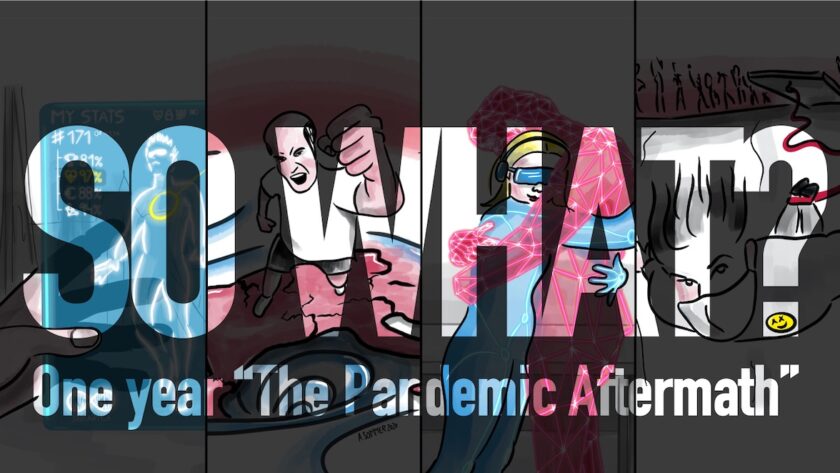One year has passed since we published our four scenarios for the year 2030. It seems like a good time to go back and check: Which scenario predictions have already materialized? Where did we make unrealistic assumptions? Can we already rule out some of the scenarios today, with nine years remaining until 2030?
In some way, this one year feels like an eternity. At the time when we built our scenarios, more than 99 percent of the reported deaths in Germany from COVID-19 had not yet happened. The news featured people clapping on their balconies in solidarity with medical professionals – rather than violent protests against coronavirus restrictions. The Robert Koch-Institut (RKI) was yet to officially recommend mask-wearing in public (on April 2nd) and it took another few weeks until masks became mandatory in stores and public transport [1]. At the time, vaccines were still a distant hope, and politicians and epidemiologists alike kept emphasizing how little we know about the virus at this point.
Considering the unprecedented nature of the coronavirus crisis and the limited level of knowledge one year ago, creating long-term scenarios on the topic carried a certain potential for embarrassment. Fortunately, we managed to avoid claims that seem foolish in hindsight. More remarkably, we also didn’t completely miss any major possible developments so far. This was probably the most difficult part as some consequential developments were not discussed widely at the time. For example, we anticipated the possibility of “escape mutations”, i.e. new strains of the virus that can break the protection from vaccination.
However, unlike some self-proclaimed “futurists” who celebrate their few accurate predictions and tend to forget mentioning their many misses, we would like to emphasize that we weren’t sure that any of our predictions would actually really happen. That is not the point of building scenarios. Their real value comes from the process of imagination and the new points of reference that enable us to learn faster, more systematically and more diverse things about the world. Hence, we tried to create an honest account about the “So what?” of our scenario analysis.
These are our key take-aways:
1. Uncertainty is no excuse for inaction.
Blunders like the delayed ordering of too little vaccines or late reactions to new waves of infection are usually justified with a lack of knowledge at the time when the decision was made. However, our scenarios prove that it was possible to anticipate what might happen. For some critical decisions, anticipating possibilities is completely sufficient. In the light of our scenarios, ordering large quantities of vaccines early – as well as supporting a drastic increase of production capacity – would have been an obvious choice. The cost of vaccinating later and more slowly was known to be disproportionally higher than the potential losses from ordering vaccines that fail during clinical trials (let alone the personal and societal consequences).
2. Experiments are like a vaccine against poor decisions.
Not all decisions can be based on anticipation. Whether and when to shut down parts of the economy or restrict personal freedom involves difficult trade-offs between public health and other important objectives. Science-led experiments can inform decisions and significantly reduce difficult trade-offs. As soon as we know that concerts with certain tested measures pose no significant health risk, we do no longer have to choose between cultural life and safety. Unfortunately, far too few such experiments have been conducted. One reason could be that it is difficult to gain the necessary support for experiments in the political domain. Scenarios can not only provide guidance for which experiments to prioritize but can also serve as a means of explaining and justifying these experiments.
3. Scenario stories mobilize people.
Ironically, during the early phase of the crisis this part worked really well: “flatten the curve” was an effective rallying cry to prevent the scenario of overwhelmed hospitals with countless deaths and to buy time for an orderly response. There was widespread support for all kinds of measures that were part of the flatten-the-curve story. After the first wave was over, however, no new compelling scenario story took its place. Instead, crisis management seemed like a series of disconnected ad-hoc measures without a clear common goal and storyline. This became a big problem as it is easy to find arguments against any individual measure that negatively affects some people more than others, or against any individual experiment that – by design – only benefits a small number of lucky concert goers or hotel visitors (if it goes well). In contrast, it is much harder to argue against a desirable scenario that includes a number of measures and experiments. Scenarios unite, their absence breeds vested interests.
4. We already see some long-term consequences of short-term actions.
We have seen drastic changes in how people and the media reacted to the coronavirus crisis during the last year. Political support for lock-down measures seem to fluctuate on an almost weekly basis nowadays. As a result, we cannot say which of our scenarios will eventually predominate (if any). This seems to imply that looking at scenarios for the year 2030 is not only pointless but even a harmful distraction from more pressing issues. This a very dangerous misconception: The “societal mood swings” that we observed don’t mean that society has no long-term memory. The crisis management has already eroded trust in politicians and public institutions. A good scenario story could bring some order into the chaos. It does matter, however, which scenario story gets established. The nature of the guiding story will influence the fundamental character of society – for better or for worse. It is far from clear that society will emerge stronger, smarter, or more likable from the crisis. The wrong story may permanently damage our democratic processes, negatively affect the mental health of an entire generation, lead to deserted inner cities or a less vibrant cultural life. Our scenarios also highlight the possible emergence of deep-rooted solidarity or a strong entrepreneurial spirit within society. The crisis may be nothing less than an inflection point for society.
For the interested reader: continue reading our detailed review of the four scenarios below
For the impatient reader: jump to the conclusion
Detailed review of the four scenarios
To “learn from the future”, we examine each scenario as it was originally published. Each scenario featured eight “milestones” per scenario covering the 10-year time horizon as well a description of the scenario “endpoint”. We compare some of the key statements with what actually happened and discuss potential implications for future developments.
You can read the original descriptions for each scenario here. For those who just need a quick reminder, these are the four scenarios with their core characteristics:
- “Digital Egosystem”: prosperity; digitized life; self-optimization; monitoring
- “The Viral Spiral”: struggle; protectionism; scapegoats; distraction
- “Solidarity RULES!”: solidarity; sufficiency; glocal; moral superiority
- “Dare, with care”: liberal; entrepreneurial; pragmatic; uncertainty
Not surprisingly, for most of the concrete statements we made about possible futures it is still too early to judge. However, much has happened during the last year. With our so-called Scenario Tracking we identified hundreds of signals that reflect different scenarios. During the tracking period, “The Viral Spiral” and “Solidarity RULES!” scenarios showed the biggest traction. We can already conclude that we are not on a straight path to any of the four scenarios. Yet it is also too early to rule out any of the four scenarios to become the dominant state of the year 2030 in Germany.
Scenario 1 – “Digital Egosystem”: a False Start
One core assumption of this scenario was that digitalization would play a much bigger role in people’s lives:
Milestone 1 (excerpt): “… As lockdowns persist, people get used to digital tools for virtual collaboration. …”. And indeed, videoconferencing, online shopping, gaming, streaming and other digital services have seen impressive uptakes in adoption [2].
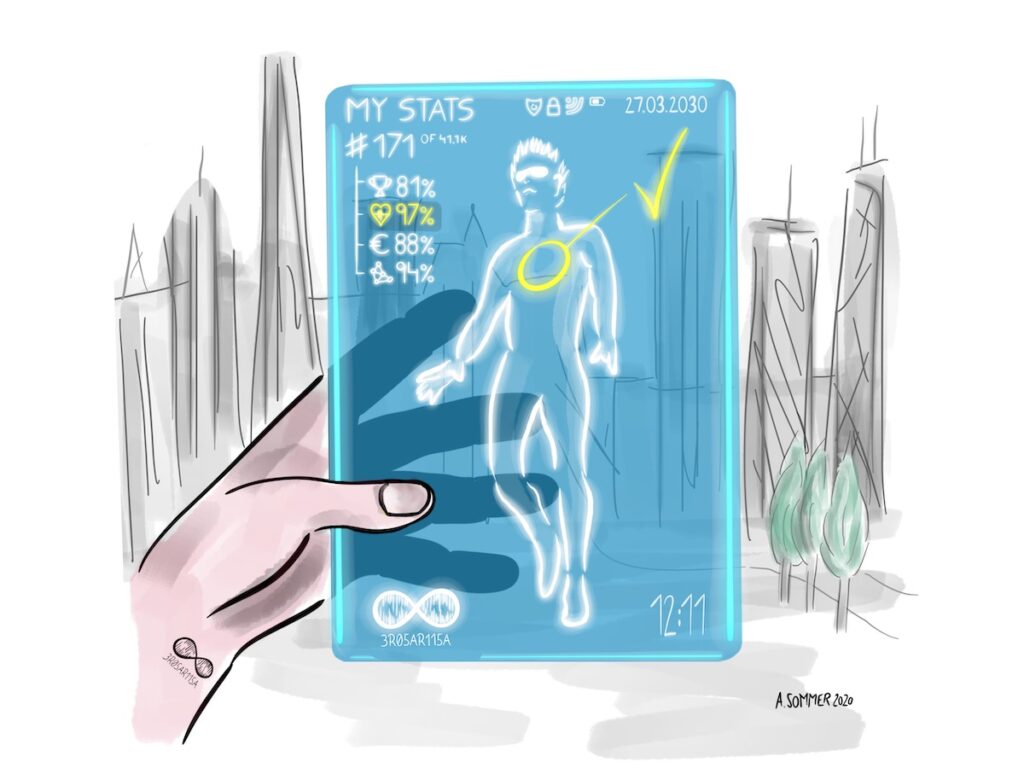
Internationally, the development of Zoom Video Communications is exemplary for a trend that we described in milestone 2: “As a consequence, entrepreneurial energy and venture capital is focused on remote tools that help people manage and enjoy their lives online.” Zoom multiplied its user base since the crisis began and is currently worth around USD 100 billion (as of mid-April 2021 [3]).
At the same time, scenario 1 assumes that Germany follows the lead of countries like South Korea to combat the spread of the virus with digital means: “Meanwhile the corona crisis begins to disappear. Countries like South Korea that successfully controlled the virus through digital monitoring are considered to be best practices.” (milestone 3). Clearly, the crisis is far from over yet. South Korea was indeed comparatively successful in its fight against the coronavirus – the country has only a tiny fraction of deaths per capita compared to Germany. And yet, Germany did not – or could not – follow this example. The second wave hit Germany hard, the third wave is under way, and criticism about Germany’s inability to manage the crisis gets louder and louder.
Criticism explicitly includes shortcomings related to digitization:
- The German coronavirus tracking app puts a lot of emphasis on privacy but turned out to be an ineffective weapon against the spread of the virus.
- Many schools struggled to implement remote education satisfactorily (and still struggle today, one year later).
- The news is full of reports about dramatic deficits in digitalization of the German bureaucracy. Latest example: the chaos concerning getting vaccination appointments.
Overall, the German self-image of being the global efficiency champion has gotten more than just a few cracks. Maybe this sobering experience right now will be a turning point. Maybe digitalization will now finally get the push it needs to generate the productivity gains that “Digital Egosystem” assumes. Maybe the Germans will shift their priority from privacy to possibility – with all the positive and negative consequences this would imply. Maybe. But maybe not.
Scenario 2 – “The Viral Spiral”: Backroad to Hell
Scenario 2 is one where we would be quite happy if some of our assumptions turned out to be totally unrealistic in hindsight.
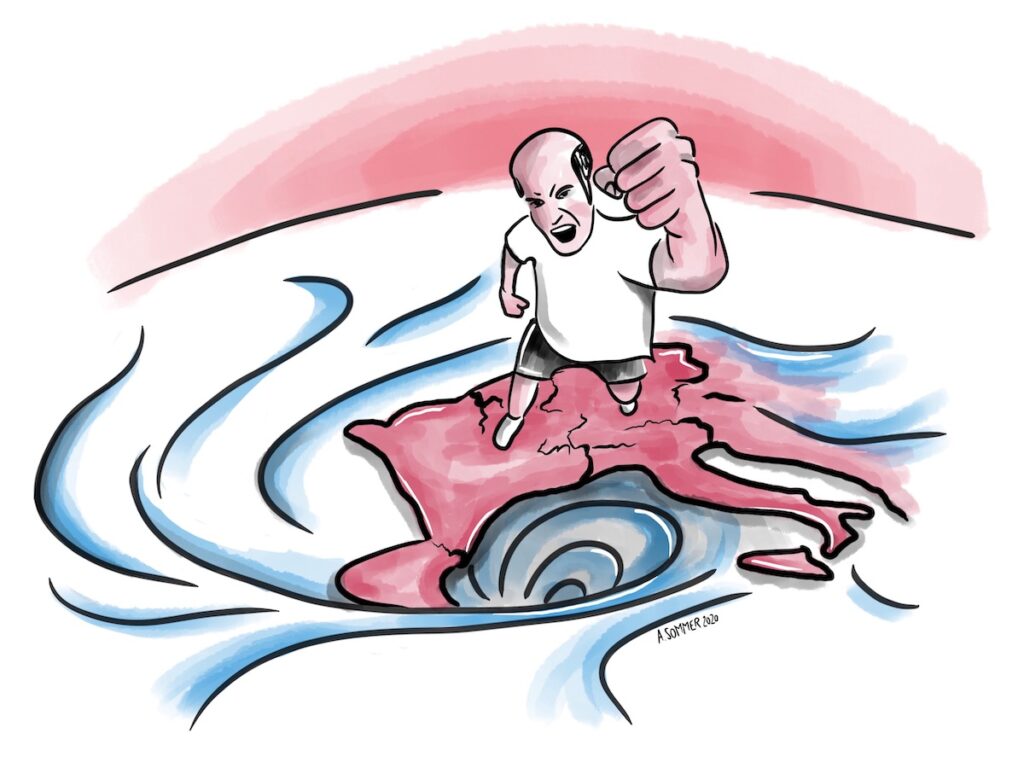
Unfortunately, the first two milestones pretty much described what happened:
Milestone 1 (excerpt): “Initial measures to fight the virus around the world were often harsh but not implemented effectively. …”. With more than 75,000 reported COVID-19 deaths in Germany by early April 2021 – despite the prolonged closure of businesses, schools and other measures to reduce the spread, our statement from 2020 seems like a fair description. Globally, the death toll is about to reach three million [4]. Still undecided is the part of the original statement that followed – whether the true extent of the damage to the global economy is truly dramatic but not yet fully visible, due to (temporary) relief from large stimulus packages. It is still conceivable that we will see a delayed but huge wave of bankruptcies in the next couple of years.
Milestone 2: “Soon, the first scandals get uncovered: several companies and rich individuals had misappropriated state money or taken advantage of the crisis. Violent protests erupt.” Sadly, the recent “mask scandal” provides a high-profile example: in various cases, politicians apparently received several hundred thousand Euros of commission (through their companies) for mask sales of private companies [5]. Violent protests are also already happening, although they are more directed against enacted state measures related to the coronavirus than being a direct result of the scandal [6].
At least for milestone 3, the world seems to have taken a different turn: the original assumption was that “… In an attempt to protect national economic interests, the US leads the way by enacting far-reaching laws on domestic production of ‘systemically relevant products’. Escalating trade conflicts are the result.” For a while this seemed like a very plausible outcome. With the election of President Biden, however, this danger seems to have been averted – at least until the next election.
Further expected developments in the coming years for “The Viral Spiral” include dramatic cuts of social benefits, a series of triumphs of extremist parties across the EU and the exit of several countries from the EU until 2024. This still seems hard to imagine despite all that happened in the meantime. On the other hand: Who would have thought that BREXIT could actually happen three years ago?
Scenario 3 – “Solidarity RULES!”: Will ‘Generation Corona’ take the lead?
One basic assumption of this scenario is that in order for solidarity to become a dominant force in Germany and the EU, the crisis must act as a wake-up call – but not become a total catastrophe that would undermine acts of solidarity by driving civil society too far apart and by turning EU countries into bitter adversaries.
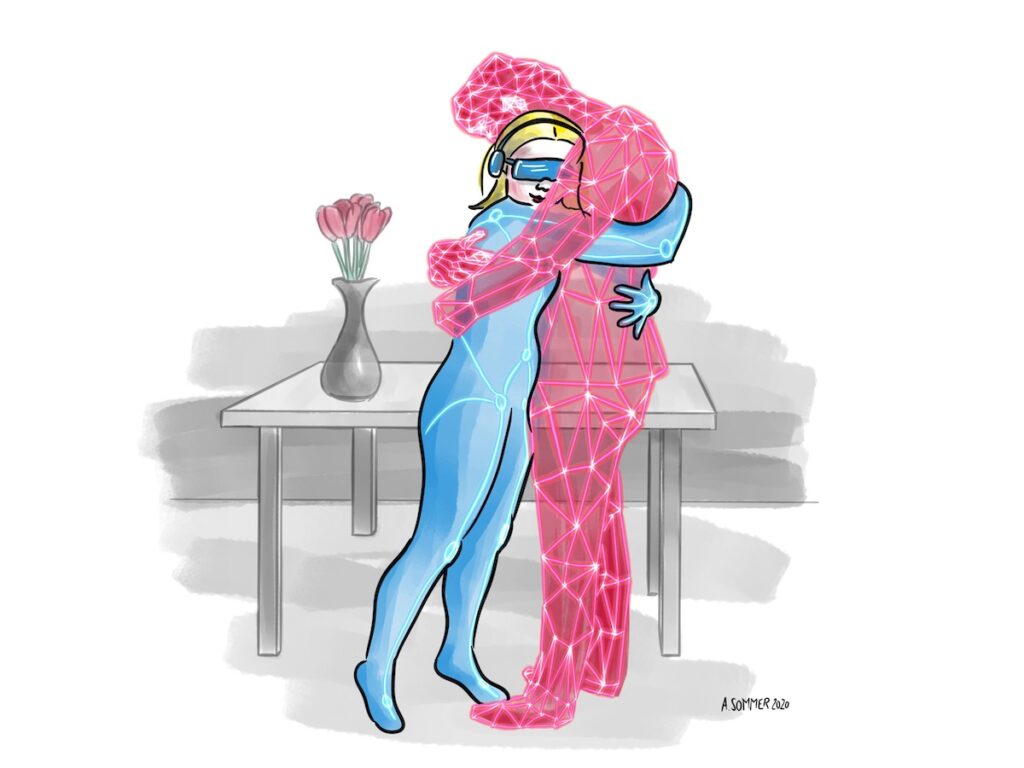
This is how we originally phrased it:
Milestone 1 (excerpt): “Luckily, the worst case in terms of corona deaths and economic consequences has not materialized. However, prolonged social distancing and continued cautionary measures for gatherings take their toll: Many, especially younger people develop mental problems like anxiety or loneliness…”
The final verdict on how bad Germany was hit by the crisis is still pending. The initial consensus after the first wave that Germany managed the crisis very well has vanished. Public opinion has shifted starting with the second wave in winter 2020/21, although most people would still not consider latest developments the “worst case”. Regarding the expected psychological impact especially on younger people, there is already scientific evidence: A study with German families with 7- to 17-year-old children and adolescents showed a strong increase of mental health problems (17.8% vs. 9.9% the year before) as well as anxiety levels (24.1% vs. 14.9%) [7].
It remains to be seen whether this leads to milestone 2, “At the same time, the desire to do good reaches a new level. “Fridays for Future” got temporarily thwarted by the crisis but is now refueled by the desire for solidarity and purpose that unites the younger generation. An even broader social movement for international solidarity and sustainability emerges.”
The tough negotiations about EU relief packages [8] and the harsh criticism of the EU regarding its vaccine strategy rather point in the other direction. However, social movements can take some time to build up, and “Generation C” (C as in Coronavirus) may become the driving force behind it.
A less desirable aspect of “Solidarity RULES!” is the assumed view of “social condemnation and public shaming … as a legitimate necessity” (from the scenario description). During our Scenario Tracking we found a number of examples that seem to support these more concerning versions of solidarity. A study at the Goethe-Universität in Frankfurt (Main) found that one third of the students of social sciences feel they cannot openly share their real opinion during discussions [9]. Controversies around this topic existed before the crisis, but it may act as a strong catalyst that aggravates the problem.
In summary, both a nice and an ugly version of “Solidarity RULES!” are still conceivable – even if solidarity temporarily steps into the background amid rapidly changing new crisis situations.
Scenario 4 – “Dare, with care”: to open or not to open
This scenario assumes society trusts in the responsibility of individuals and that public health interests are balanced with strong economic interests. We didn’t see much evidence for this in year 1 of the crisis. With the diminishing trust in the state to manage the crisis, however, scenario 4 may see a comeback.
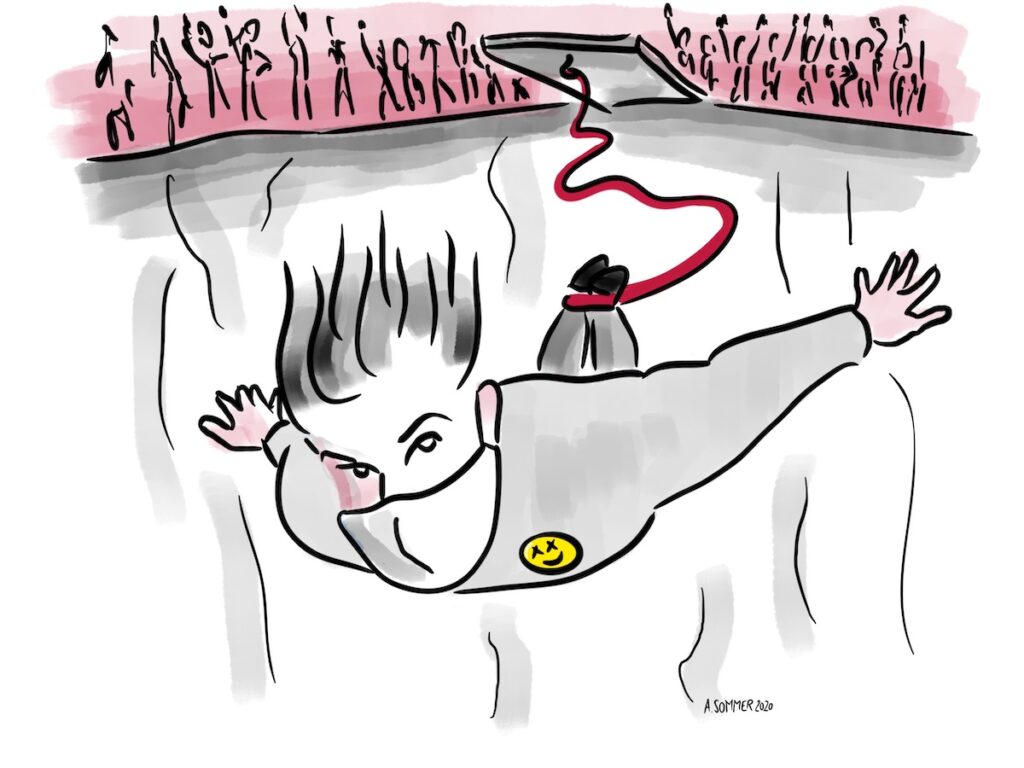
Milestone 1: “Initial strict measures like lockdowns and company closures ease the pressure on the healthcare system. However, it soon becomes clear that upholding these measures would come at an extremely high cost in economic, social and political terms.”
As the crisis continues, economic damages keep piling up and coronavirus fatigue is spreading. Recent opening measures, hastily taken back amid the strong spread of the “British variant”, represent an attempted shift in strategy by the German government. The concern to lose vital support by citizens has triggered actions by Minister Presidents of various states that are widely considered to be poorly coordinated and short-sighted. These events may be inconsequential if the coronavirus gets eradicated in Germany by the end of 2021 through a successful vaccination campaign. But what if not? The scenario may be back in the game if the coronavirus becomes a long-term phenomenon.
This was our scenario assumption from milestone 2:
“[…] The coronavirus becomes a seasonal phenomenon and new cases continue to occur in significant quantities. A first vaccine becomes available in early 2021 but is not effective against certain new strains of the virus.”
Some alarming early warning signals already exist: For example, the efficacy of the AstraZeneca vaccine is reduced with respect to the “South African strain”, but vaccines still offer some level of protection [10]. Future escape mutations of the virus that overcome all available vaccines are at least plausible given the high level of infections globally.
In order to find an acceptable way of living with the virus, systematic experimentation would be extremely useful – as opposed to mindless trial and error. What is commonplace in the field of innovation nowadays could also create enormous value for coronavirus politics. Scientific experiments could provide reliable answers to questions like “How exactly does the virus actually spread in real-world situations? What kind of measures are (not) effective when people are together in an office, a school, or in a concert hall?”
To date, smart experiments have been shockingly rare in Germany. Maybe officials fear the fact that experiments can fail and that they would be unfairly blamed even for a smart, insightful experiment. Or they fear the wrath of those whose interests are not prioritized. Or, it is simply a consequence of outdated bureaucracy that ties everybody’s hands.
On a positive note: this crisis may teach us the hard way that we have become too inflexible and risk-averse both in our thinking and our doing. If profound enough, this lesson could be invaluable for the German society to deal with future, potentially even bigger crises.
Conclusion: society at the crossroads
No matter how the crisis continues to unfold, the first year has already surfaced some big deficiencies in Germany. Digitalization and an ineffective administration are just two of the most prominent examples. One might argue that all these problems were known before, in some cases for many, many years. While this is probably true, politics is not the art of the knowable but the art of the possible, as the aphorism goes.
This crisis has the potential to provide the critical mass of support for far-reaching change in various fields. Critics may object that scenarios are not of much help then if not knowledge, but the experience of failure, is necessary for the required urgency for change to emerge. This argument neglects three powerful features that scenarios offer:
- Scenarios can help us “experience” and acknowledge harmful developments before we actually hit rock bottom.
- Scenarios can guide us in which change to pursue for a desirable long-term outcome.
- Scenarios open our crisis-clouded minds for opportunities beyond fixing immediate problems. One example: “Emotech” that facilitates meaningful, personal relationships at a distance as described in scenario 3. This kind of technology would be worthwhile with or without the coronavirus.
In combination, these three features can turn scenarios into optimistic, self-fulfilling prophecies. Once the desired future is known and widely shared, people will find ways to make it happen.
If you want to learn more about the methodology that was used to create the original scenarios, please visit scenario-sprint.com.
Acknowledgements:
Special thanks to Nina Kremser for her painful but invaluable feedback on previous versions of this article. All drawings © SOMMERRUST 2020-21.
Sources:
[1] www.tagesschau.de on the new RKI recommendation (April 2, 2020; accessed April 15, 2021): “Auch RKI empfiehlt nun allen eine Maske”, https://www.tagesschau.de/inland/schutzmasken-coronavirus-103.html and on mandatory mask-wearing (April 27, 2020; accessed April 15, 2021): “Ab sofort nur noch ‘mit’”, https://www.tagesschau.de/inland/corona-mundschutz-103.html
[2] Bitkom (March 10, 2021; accessed April 15, 2021): „Corona sorgt für Digitalisierungsschub in deutschen Haushalten“, https://www.bitkom.org/Presse/Presseinformation/Corona-sorgt-fuer-Digitalisierungsschub-in-deutschen-Haushalten
[3] NASDAQ (accessed April 14, 2021): „Zoom Video Communications, Inc. Class A Common Stock“, https://www.nasdaq.com/market-activity/stocks/zm
[4] Wikipedia (accessed April 15, 2021): „COVID-19-Pandemie in Deutschland“, https://de.wikipedia.org/wiki/COVID-19-Pandemie_in_Deutschland
[5] FAZ.net (March 25, 2021; accessed April 15, 2021): „Haftbefehl gegen Beschuldigten in Maskenaffäre erlassen“, https://www.faz.net/aktuell/politik/inland/haftbefehl-gegen-einen-beschuldigten-in-maskenaffaere-erlassen-17262761.html and www.tagesschau.de (March 8, 2021; accessed April 15, 2021): „Unionsabgeordnete beugen sich dem Druck“, https://www.tagesschau.de/inland/innenpolitik/nuesslein-loebel-101.html
[6] www.tagesschau.de (March 13, 2021; accessed April 15, 2021): “Angriffe gegen Polizisten bei Corona-Demo”, https://www.tagesschau.de/inland/demos-corona-109.html
[7] Ravens-Sieberer, U., Kaman, A., Erhart, M. et al. Impact of the COVID-19 pandemic on quality of life and mental health in children and adolescents in Germany. Eur Child Adolesc Psychiatry (2021). https://doi.org/10.1007/s00787-021-01726-5
[8] www.tagesschau.de (July 21, 2020; accessed April 15, 2021): “Nach der Einigung ist vor der Einigung”, https://www.tagesschau.de/ausland/nach-einigung-eu-gipfel-103.html
[9] Interview on SZ.de (November 13, 2020; accessed April 15, 2021):“’Wir haben nur einen Schnappschuss gemacht‘“, https://www.sueddeutsche.de/kultur/interview-matthias-revers-richard-traunmueller-studie-linke-meinungsfreiheit-1.5114852
[10] Tang, J. on www.theguardian.com (April 14, 2021; accessed April 15, 2021) “Covid variants will be the next big challenge. Can vaccines protect us?”, https://www.theguardian.com/commentisfree/2021/apr/14/variants-challenge-lockdown-covid-vaccines-south-african
